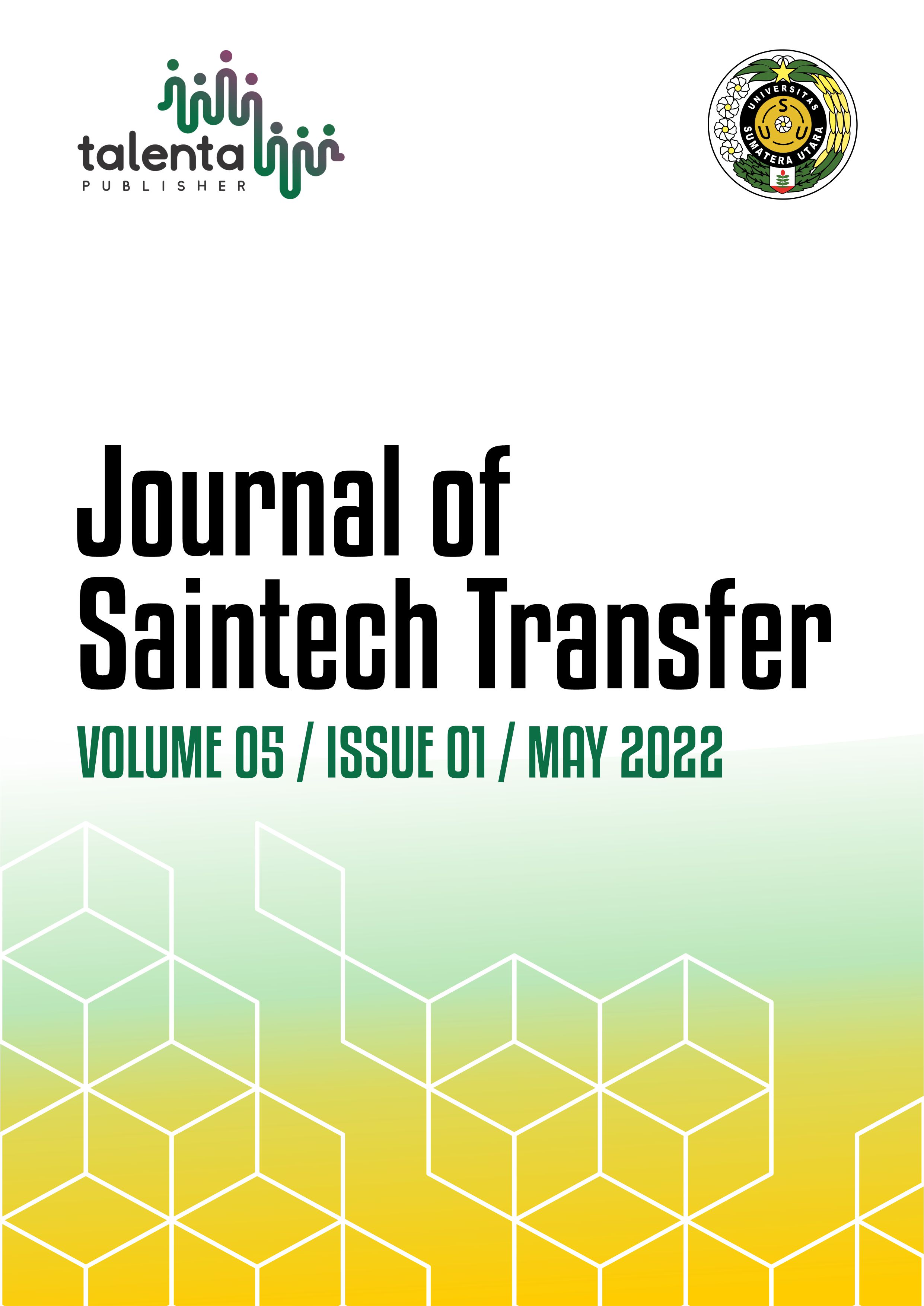Bokashi Application for Organic Farming in Manuk Mulia Village, Karo District
DOI:
https://doi.org/10.32734/jst.v5i1.8851Keywords:
Bokashi, Cow feces, Waste, Fermentation, EnvironmentAbstract
Berkah Mulia is a farmer group in Manuk Mulia Village, Karo Regency with 19 members. Livestock developments may cause several problems such as environmental pollution in the form of livestock manure which causes unhealthy environmental conditions. In addition, the unstable supply of chemical fertilizers and high prices are problems that are quite difficult to solve. The solution to this problem is the utilization of cattle feces in Bokashi which can improve the physical, chemical, and biological properties of the soil due to the use of excessive chemical fertilizers to improve soil quality. Bokashi is compost produced from the fermentation process or organic matter fermentation with EM4 technology. The method implemented in the community service is having interviews and discussions to find the solution for all problems. Then use teaching media in the form of banners and brochures about the method of making bokashi. Training, counseling, and mentoring are carried out by providing materials and practices for making bokashi using cow feces. The results of the activity show that this community service can increase the knowledge and skills of farmers by 84% related to making bokashi. This activity can also reduce environmental pollution and reduce the cost of purchasing chemical fertilizers so that horticultural crop production increases.
Downloads
References
Central Bureau of Statistics. Kabupaten Karo Dalam Angka [KaroRegency in Figure]. CV E Karya. 2020.
D. H. Pangaribuan, M. Yasir, and N. K. Utami “Dampak Bokashi Kotoran Ternak dalam Pengurangan Pemakaian Pupuk Anorganik pada Budidaya Tanaman Tomat [The Impact of Bokashi Manure in Reducing the Use of Inorganic Fertilizers in Tomato Cultivation]â€, J. Agron. Indones. Indonesian J. Agron, Vol. 40, No. 3, pp. 204–210. 2012.
A. Djunaedy “Pengaruh Jenis Dan Dosis Pupuk Bokashi Terhadap Pertumbuhan dan Hasil Kacang Panjang [Effect of Type and Dosage of Bokashi Fertilizer on Long Bean Growth and Yield]†Agrovigor, Vol. 2, No. 1, pp. 42–46. 2009.
Imban S, Rumambi A, Malalantang S. “Pengaruh Pemanfaatan Bokashi Feses Sapi Terhadap Pertumbuhan Sorgum Kualitas Kawali [The Effect of Bokashi Utilization of Cow Feces on the Growth of Sorghum Quality Kawali]†Jurnal Zootek. Vol. 37. No. 1 pp 80- 87. 2017.
TA Atikah “Pertumbuhan dan hasil tanaman terung ungu varietas Yumi F1 dengan pemberian berbagai bahan organik dan lama inkubasi pada tanah berpasir [Growth and yield of purple eggplant of Yumi F1 variety by giving various organic matter and incubation time on sandy soil]†Anterior Jurnal. Vol 12, No. 2, pp 6-12. 2013.
MSS Randu, Suek F.S, Wirawan I. G.K.O, and A. Semang, “Pemberdayaan Peternak Sapi Pola Paronisasi melalui Pembuatan Pupuk Bokashi di Desa Oeletsala, Kabupaten Kupang [Empowerment of Paronized Cattle Breeders through Making Bokashi Fertilizer in Oeletsala Village, Kupang Regency]†Agrokreatif J. Ilmu. Pengabdi Kepada. Masy., Vol. 6, No. 1, pp. 15–23. 2020.
S. Sadjadi, B. Herlina, and W. Supendi, “Level Penambahan Bokashi Kotoran Sapi terhadap Pertumbuhan dan Produksi pada Panen Pertama Rumput Raja (Pennisetum purpureophoides) [Level of Bokashi Addition of Cow Manure on Growth and Production at First Harvest of King Grass (Pennisetum purpureophoides)]†J. Sain Peternak. Indonesia., Vol. 12, No. 4, pp. 411–418. 2017.
A. Noor and R.D. Ningsih. “Upaya meningkatkan kesuburan dan produktivitas tanah di lahan kering [Efforts to increase soil fertility and productivity in dry land]†Prosiding Lokakarya Strategi Pembangunan Pertanian Wilayah Kalimantan. 2001.
A. Rahim, “Pertumbuhan dan Produksi Tanaman Tomat (Lycopersicum esculentum Mill) Pada Berbagai Dosis Kotoran Sapidan Volume Penyiraman [Growth and Production of Tomato Plants (Lycopersicum esculentum Mill) at Various Doses of Cow Manure and Watering Volume]†Agrokompleks, Vol. 4, No. 9. 2015.
S. Morgo, A.R. Thaha, Y. S. Patadungan. “Pengaruh Berbagai Jenis Bokashi Terhadap Serapan Fosfor Tanaman Jagung Manis (Zea mays saccarata) [Effect of Various Types of Bokashi on Phosphorus Uptake in Sweet Corn (Zea mays saccarata) Plants]â€. J. Agrotekbis Vol. 3, No. 3, pp. 329 – 337. 2015.
T. Mardikanto, “Penyuluhan Pembangunan Pertanianâ€. UNS Press. Surakarta. 1993
P. Patriani, E. Mirwandhono, U. Hasanah, N. Ginting. “Coffee Seed Waste silage technology as goat feed in Tigapanah Sub-district, Karo regency." Journal of Saintech Transfer (JST). Vol. 3, No. 2, pp. 77-85. 2020.
P. Patriani, E. S Nasution, U. Hasanah. “Application of Liquid Organic Fertilizer from Beef Cattle Feces and Environmental Management in Suka Sipilihen, Karo Regency†Journal of Saintech Transfer (JST) Vol. 4, No. 1, pp 1-9. 2021.
Hasnudi, P. Patriani, G. A. W Siregar, dan S. Umar. “Utilization of Kepok Banana Peel Waste Fermented Using EM4 as Sheep Feed-in Medan Tuntungan Sub District." Journal of Saintech Transfer (JST). Vol. 2, No. 2, pp. 142-149. 2019.
P. S. Sheng and X. H. Lian X H. “Influence of EM Bokashi on Nodulation, Physiological Characters and Yield of Peanut in Nature Farming Fields†Journal of Sustainable Agriculture. Vol. 19 . No. 4. pp 105-112. 2002.
S. Xiaohou, T. Min, J. Ping, C. Weiling. “Effect of EM Bokashi application on control of secondary soil salinization†Water Science and Engineering, Vol. 1. No. 4, pp 99-106. 2008.
Downloads
Published
How to Cite
Issue
Section
License
Copyright (c) 2022 Journal of Saintech Transfer

This work is licensed under a Creative Commons Attribution-ShareAlike 4.0 International License.















